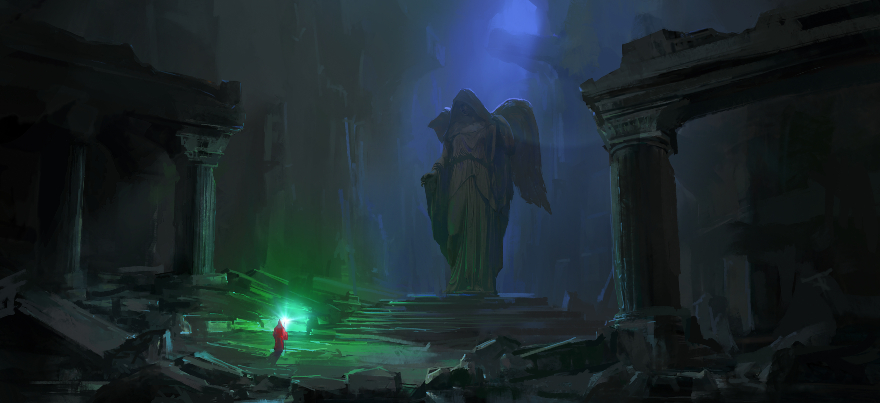In September of 1931 J.R.R. Tolkien, Hugo Dyson, and C.S. Lewis took part in a late-night conversation at Oxford University. This was not only a pivotal moment in Lewis’s life (helping to convince him of the validity of Christianity), but also a well-chronicled moment for mythopoeic grace. Two of the great literary figures of the twentieth century struggled for, and found, common ground that night—through the concept of myth.
I will not attempt to delve into ‘myth’ as Tolkien and Lewis understood it; Alister McGrath does that very well in the third chapter of his book The Intellectual World of C.S. Lewis. I will simply suggest that divine truth (absolute reality) exceeds the ability of human logic to contain it; that includes theology (teaching and preaching)—and certainly politics and philosophy. Like the parables of Jesus, myth has the ability to reach beyond logic and reason (important though those things are).
The Bible tells us that grace comes through faith, and that faith is the conviction of things unseen. It could be argued, then, that grace is the result of faith in something our modern culture would consider a myth (the unseen world). Inherent in modern semantics is the notion that all myths are patently false. But the Christian (of the Tolkien/Lewis/MacDonald variety) rejects the assumption of falsity, while gladly embracing the mythic nature of his faith.
Why does this matter? Because the vast majority of Christian thought and teaching has been sorely lacking in any mythic sensibility for a very long time. I would argue that most theology has a tendency to overcompensate for its mythical-sounding claims by overemphasizing an academic approach (as if that might help the modernists to forget about the baby born of a virgin, or the dead man rising from the grave). This exclusive bent toward cold, hard, Christian “reason,” I think, is what Tolkien and Lewis wished to balance through their work in giving the world new, modern, Christian myths.
Rather than constructing rigid systems of theology that restricted possibilities, Tolkien and Lewis constructed mythical worlds of beauty and encouraged their readers to use their imaginations. Nearly any Christian will agree that the Bible tells a story, but it is far more difficult to find Christians who view the overarching biblical narrative as primary. Tolkien and Lewis were convinced of its primacy; for them, individual doctrines (important though they are) were of a lesser significance.
A mythopoeic mindset is required to imagine the Kingdom of God. This fallen realm we call Earth runs according to the law of sin and death, but it takes faith in an unseen realm to imagine something like the law of the Spirit. It’s nothing short of magical when a person chooses to absorb the painful damage and forgive an offender, rather than rally the mob and attempt to ‘crucify’ him. Likewise, when my struggle is for individual people rather than for things, it feels as if I am taking part in the working backward of some curse. We can easily imagine run-of-the-mill human grace, but a grace that covers the real sin of real people… that’s mythopoeic grace!
I’ve grown tired of seeing the Bible cracked open by men who look like weary headmasters or smooth politicians. I’d rather see the ‘true myth’ opened by someone with a spark of wonder in their eye, like a child curled up with a fairy tale. If the biblical narrative of an infinite God is true, all the more reason to approach it with a mythopoeic mind. The danger lies not nearly so much in imagining the wrong things (the narrative remains to guide us), but in our sense of wonder shriveling up altogether if we don’t nurture it. The ‘true myth’ tantalizes, as all good myths do—and sometimes reading a story is a lot like getting to know a real person.
Featured Illustration by liuzishan
- Mythopoeic Grace - September 13, 2021
- The Equality of the Fallen - March 17, 2021
- Reframing Faith Through Fantasy - December 23, 2020

One among so many wonderful quotes: \”I’ve grown tired of seeing the Bible cracked open by men who look like weary headmasters or smooth politicians. I’d rather see the ‘true myth’ opened by someone with a spark of wonder in their eye, like a child curled up with a fairy tale.\” – This is something I can imagine Tolkien, Lewis, or MacDonald saying themselves – most certainly a sentiment they would applaud.
Michael Heiser\’s book, \”The Unseen Realm – Recovering the supernatural worldview of the Bible\” echoes your very well-presented argument and prompted me to reopen and reread the bible with that \”spark of wonder…like a child curled up with a fairy tale.\”
I’ll have to check out Heiser’s book, it sounds right up my alley! Thanks for the kind words!